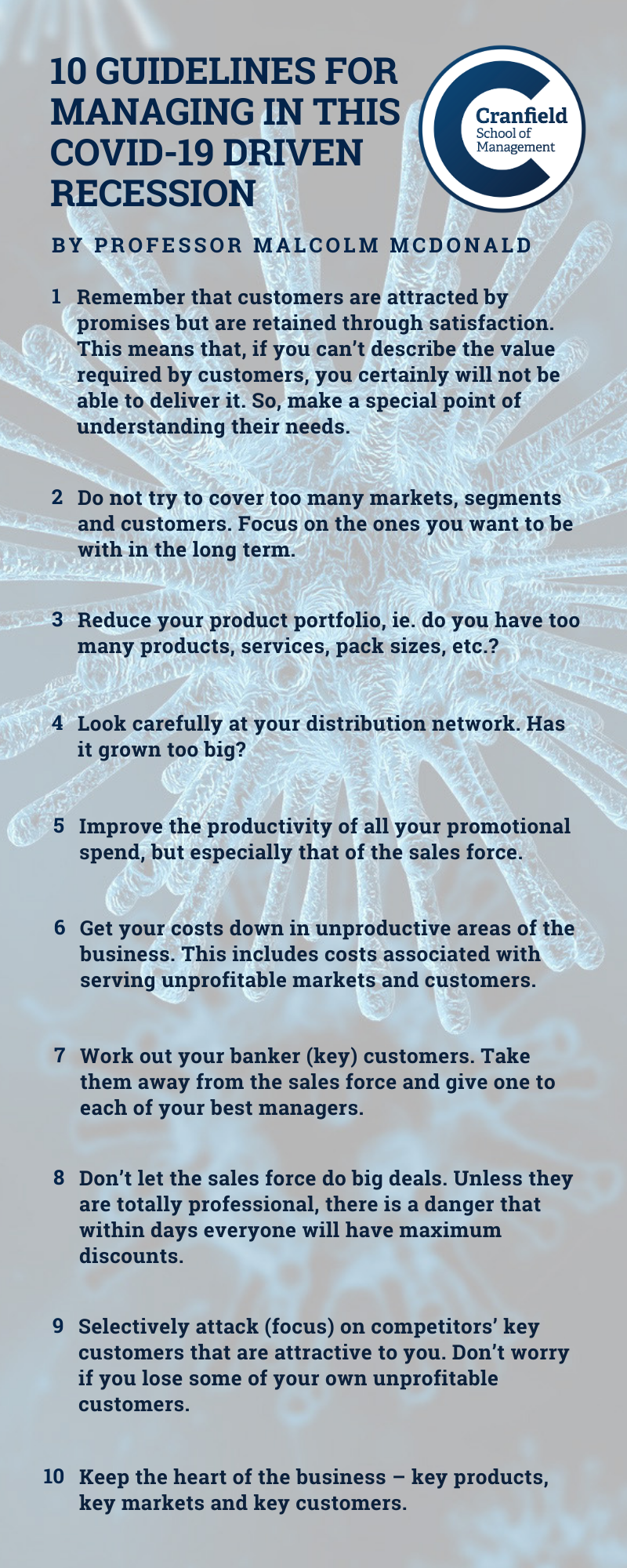Marketing in this Covid-19 driven recession
25/03/2020

Professor Malcolm McDonald offers these thoughts during these difficult times in order to encourage all those of us who are intensely worried by the effects of the COVID-19 driven recession.
It is pure fiction to imagine that the impending recession is going to disappear soon.
The typical reaction to such misfortune is what Andrew Lorenz in the Financial Times describes as “anorexia industrialosa”, an excessive desire to be leaner and fitter, leading to emaciation and eventually death. Yes, of course there is a necessity for cost cutting, but it has to be done sensibly, as I shall spell out later.
But if this is the only response to recession, it is doomed to failure, largely because it results in even worse service to customers and customers just will not stand for this anymore.
Why is this?
Perhaps we need reminding briefly that the rules of competition have changed. The “make and sell” model has been killed off by a new wave of entrepreneurial technology-enabled competitors unfettered by the baggage of legacy bureaucracy, assets, cultures and behaviours. The processing of information about products has been separated from the products themselves and customers can now search for and evaluate them independently of those who have a vested interest in selling them. Customers now have as much information about suppliers as suppliers have traditionally accumulated about their customers. This new state has created a new dimension of competition based on who most effectively acts in the customers’ interests. So, this is the backcloth against which we face this new challenge in the early part of 2020.
I have 120 pieces of scholarly research to prove that long term successful companies take the trouble to segment their markets. Segments are groups of customers with the same or similar needs, not sectors. They work hard at understanding these needs and their behaviour patterns. They prioritise these segments according to their likelihood of enabling the company to achieve its profit objectives and they then develop appropriate product/services packages for each. They are ruthless in times of recession at focusing their attention on the segments they intend to keep in the long term, and they prune out those which are a drag on their resources. Only then is cost cutting and downsizing justified.
I am, of course, referring to Pareto’s Law (the 80/20 “rule”) About 20% of your customers will deliver about 80% of your revenue and profits, so trying to delight everyone with all of your offers guarantees average service that will delight no-one. By identifying your core market of primary customers and delighting them with selected differential offers, you will successfully preserve a resilient customer base.
Although this will not apply to all organisations, here are some guidelines for managing in this COVID-19-driven recession based on what I have said above.

The problem, of course, for certain types of businesses with massive fixed costs such as airlines, is on an entirely different scale and whilst the principles are the same, this short article is not intended for them.
Categories & Tags:
Leave a comment on this post:
You might also like…
Keren Tuv: My Cranfield experience studying Renewable Energy
Hello, my name is Keren, I am from London, UK, and I am studying Renewable Energy MSc. My journey to discovering Cranfield University began when I first decided to return to academia to pursue ...
3D Metal Manufacturing in space: A look into the future
David Rico Sierra, Research Fellow in Additive Manufacturing, was recently involved in an exciting project to manufacture parts using 3D printers in space. Here he reflects on his time working with Airbus in Toulouse… ...
A Legacy of Courage: From India to Britain, Three Generations Find Their Home
My story begins with my grandfather, who plucked up the courage to travel aboard at the age of 22 and start a new life in the UK. I don’t think he would have thought that ...
Cranfield to JLR: mastering mechatronics for a dream career
My name is Jerin Tom, and in 2023 I graduated from Cranfield with an MSc in Automotive Mechatronics. Originally from India, I've always been fascinated by the world of automobiles. Why Cranfield and the ...
Bringing the vision of advanced air mobility closer to reality
Experts at Cranfield University led by Professor Antonios Tsourdos, Head of the Autonomous and Cyber-Physical Systems Centre, are part of the Air Mobility Ecosystem Consortium (AMEC), which aims to demonstrate the commercial and operational ...
Using grey literature in your research: A short guide
As you research and write your thesis, you might come across, or be looking for, ‘grey literature’. This is quite simply material that is either unpublished, or published but not in a commercial form. Types ...






